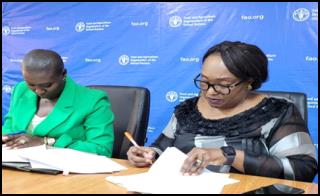The Food and Agriculture Organization (FAO) of the United Nations has signed a Memorandum of Understanding (MOU) with the Government of Liberia for the conduct of a Regional Demersal and Pelagic Resources Survey in the Western Gulf of Guinea.
The signing ceremony, which marks a significant milestone in the commitment to sustainable fisheries management and the promotion of food security in the region, took place on February 19, 2024 in Monrovia. The collaboration between the Government of Liberia and the FAO underscores the shared vision to enhance the understanding and management of demersal and pelagic resources in the western Gulf of Guinea.
As part of the MOU, FAO will be responsible for surveying with the participation of the Institute of Marine Research (IMR) and provide other services, as well as technical inputs per the work plan contained in the document.
The survey will be conducted by the research vessel Fridtjof Nansen, consistent with the Program Agreement between the Norwegian Agency for Development Cooperation, the Institute of Marine Research of Bergen (IMR), and FAO, titled: “Supporting the Application of the Ecosystem Approach to Fisheries Management considering Climate and Pollution Impacts” (EAF-Nansen Program”). IMR, as the operator of the vessel, will be responsible for providing vessel services.
On the other hand, NaFAA will, among other things, be responsible for obtaining all clearances, authorizations, licenses, and necessary permits by the Government of Liberia for the vessel, and all personnel assigned to the project, and shall keep FAO informed in this regard. The vessel shall fly the flag of Norway as the country of registration, and the flag of the United Nations as the housing flag.
Speaking during the signing ceremony of the MOU, FAO Liberia Representative, Madam Bintia Stephen Tchicaya, expressed her enthusiasm for the partnership and emphasized the organization’s dedication and provision of technical support to the development of sustainable fisheries in Liberia, saying that the partnership agreement is part of the FAO EAF Nansen-Program, which focuses on conducting surveys of marine resources across coastal regions of the world for sustainable use of the oceans.
Madam Tchicaya described as very important, the partnership agreement with the Government of Liberia, noting that it will provide scientific data on the marine resources in the Liberian waters, which will help the Liberian authorities put into place safeguard measures that will discourage improper use of the ocean and provide a clearer approach to the governance of the Liberian waters.
“The data to be obtained from the research will inform NaFAA to guide the artisanal fisheries activities by determining at what time fishers should fish and the type of fish that will be available to them. The findings from the research will also enable the Liberian authorities to understand how to intensify fisheries activities and undertake fisheries sustainably,” said FAO acting Representative in Liberia.
For her part, the Director General of NaFAA, Emma Glassco, expressed her appreciation for the collaboration with the FAO and reaffirmed Liberia’s commitment to responsible marine resource management and conservation.
She emphasized the importance of the MOU, noting that collecting data on the country’s marine resources will boost fisheries activities, saying that with the survey, Liberia will be able to identify what is in its waters and will be able to make informed decision to address marine issues.
The NaFAA DG said, for too long, the lack of data has undermined the fisheries sector; as such, the survey, when conducted, will present scientific data that will, henceforth, inform the workings of her institution by improving its governance of the sector.
“To open an industrial fishing, you must be able to be informed by scientific data, and so we, as a country, had to request technical support based on the partnership and the availability, which is how they were able to select Liberia. Liberia and many other countries were competing to get this stock assessment.
We have not been doing the stock assessment for more than a decade, but recently, you see that we are doing a stock assessment. At least we will be able to know the potential of our fisheries resources. I am so excited for this. The future of our fisheries sector is very bright,” Madam Glassco said.
The Regional Demersal and Pelagic Resources Survey will play a crucial role in providing valuable data and insights for implementing effective fisheries management strategies and ensuring the long-term viability of marine resources in the Western Gulf of Guinea. This collaborative effort reflects the collective determination of the Government of Liberia and the FAO to promote sustainable fisheries, protect marine ecosystems, and contribute to the well-being of coastal communities in the region.

